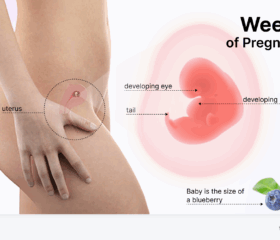Pregnancy Mood Swings: When They Start & How to Cope
One minute, you’re giddily imagining endless cuddles with your future baby. Next, you’re crying your eyes out because someone ate your last pickle from the refrigerator. Say hello to pregnancy mood swings!

You aren’t just being overdramatic. Mood swings are an all-too-common but completely normal part of pregnancy.
Let’s look into what they are, when and why they happen, and how to manage the emotional ups and downs of pregnancy.
What are pregnancy mood swings?
Mood swings during pregnancy are rapid and sometimes intense emotional shifts. 1 One moment, you may feel elated; the next, tearful or irritable, often without an apparent reason.
What causes pregnancy mood swings?
As with many pregnancy symptoms, hormones are the principal cause of mood swings.
The main hormonal drivers behind pregnancy mood swings are increased levels of estrogen and progesterone. 2 Your hormones affect the brain chemicals that regulate your mood, serotonin and dopamine.
However, hormones aren’t the only factor. Other potential contributors to moodiness include:
- Physical discomfort: Pregnancy symptoms like constipation, bloating, morning sickness (nausea), fatigue, and body aches can wear on your patience and mood.
- Sleep disruption: If you’re experiencing pregnancy insomnia or other sleep issues, that can also quickly impact your emotional resilience. Consider looking into pregnancy pillows to improve your sleep quality.
- Stress and anxiety: Worries about labor, parenting, finances, or health can fuel emotional instability.
- Lifestyle changes: It can be hard to stay upbeat when you’re adjusting to new dietary restrictions, drinking less caffeine, and adapting to a new (more restrictive) routine..
- Blood sugar fluctuations: Lastly, skipping meals or eating too many simple carbs—which is fairly likely if you’re nauseous—can cause emotional crashes.
It’s important to distinguish everyday ups and downs from symptoms of more serious conditions like prenatal depression and anxiety, which tend to persist and interfere with daily functioning. 3
Make sure you keep a log in your journal or in a pregnancy tracker app so you have an accurate record for your doctor if necessary. The best pregnancy trackers will be able to condense all those abovementioned changes into simple, shareable reports.
When are mood swings most likely during pregnancy?
Mood swings can crop up at any point during pregnancy, but they’re most common in the first trimester and then again in the third trimester. 2
In early pregnancy, especially when you’re between 6 weeks and 10 weeks pregnant, your hormones are surging, and your body is adjusting to significant changes. 4 Some women feel emotional relief during the second trimester, only to experience another wave as the third trimester approaches.
Of course, everyone’s emotions during pregnancy are a little different. You might be tearful throughout, or feel mostly calm with the occasional outburst.
Common pregnancy emotions
It’s normal to experience a wide range of feelings during pregnancy, sometimes all on the same day.
Maybe you feel excited and elated as you imagine your baby and the life you’ll have together—while also simultaneously feeling anxious about labor, your baby’s health, or even your ability to be a parent. This is especially true if you already have other children at home and are facing the prospect of taking care of a baby in addition to them.
It’s also common to feel annoyed by even relatively small things, sad as you leave behind your pre-pregnancy routines and independence, or overwhelmed by the necessity of juggling medical appointments, symptoms, and everything else that pregnancy brings with it.
How to cope with pregnancy mood swings
Pregnancy mood swings are usually unavoidable, but there are ways to manage your emotions and stabilize your moods. Make sure you:
Look after yourself
Self-care is paramount during pregnancy, and a little TLC can do wonders for mood swings. Make time for things you enjoy, like reading a book, spending time outside, or watching your favorite show. If you’re past the first trimester, you can also enjoy a prenatal massage.
Exercise is also a great way to boost your mood and release endorphins, so regularly do pregnancy-safe workouts like walking and swimming. There are many benefits of prenatal yoga, too. 5 Deep breathing exercises, progressive muscle relaxation, and meditation can help you relax. 5
Moreover, be sure to get enough sleep, aiming for 7–8 hours each night, since fatigue can significantly worsen mood swings. 6
Eat a balanced diet and stay hydrated
Focus on whole, unprocessed foods, including plenty of vegetables, lean protein, fruit, and complex carbohydrates. Avoid processed foods or sugary snacks that could cause your blood sugar to crash. 7
Alongside following a healthy pregnancy diet, also drink plenty of water every day. Being dehydrated impacts your mood and energy levels. 8
Don’t try to do it all alone
You don’t have to deal with your mood swings alone. If you have a partner, open up to them and let them know how they can support you. You can also reach out to your family, friends, or even a dedicated support group (online or in-person) for pregnant women. Some useful resources you can check out are:
- National Maternal Mental Health Hotline: 1-833-TLC-MAMA (1-833-852-6262)
- National Alliance on Mental Illness (NAMI): (800) 950-NAMI
- Postpartum Support International: (800) 944-4PPD
- Office on Women’s Health: (800) 994-9662
If you’re having thoughts of harming yourself or your baby, you can also call the Suicide & Crisis Lifeline at 988 to get immediate help. (As you might already know, this is a general lifeline and not just for pregnancy-related crises.)
How to manage stress effectively while you’re pregnant
Managing stress during pregnancy isn’t just about feeling better. It’s also a way to support your baby’s healthy development. 9
Start by identifying what’s really weighing you down and consider whether you can delegate, delay, or drop it altogether. Setting more realistic expectations for yourself can also be a game-changer; this is not the time to aim for perfection.
Don’t be afraid to lean on others or say no to extra commitments if they add unnecessary pressure. Also, even if it’s just for a few minutes a day, slow down and focus on the strategies above to help you cope. Small steps can make a big difference.
When to speak to your doctor about your mood swings
There’s no shame if you need more support. Talk to your doctor if you have intense mood swings every day or for more than two weeks. You should also let them know if: 10
- You feel persistently sad, anxious, or hopeless
- You’ve lost interest in things you used to enjoy
- You’re having trouble eating, sleeping, or functioning on a day-to-day basis
- You have a history of mental health problems, or were previously taking medications for a mental health condition
- You’re having thoughts of harming yourself or your baby (again, if you experience this, call the 988 Suicide & Crisis Lifeline or report directly to the ER.)
Your doctor may be able to put you in touch with a therapist, prescribe medication, or use a combination of both to help you feel better. 11
Final thoughts
Pregnancy throws no shortage of curveballs at you, and mood swings are definitely some of the most emotionally draining ones.
However, mood swings are a completely normal part of pregnancy. You don’t have to feel happy every single day. With a little self-care and support from your doctor and loved ones, you’ll be able to manage those ups and downs.
Article Sources
- Office on Women's Health. "Pregnancy and body image" Retrieved August 13, 2025.
- American Pregnancy Association. "Mood Swings During Pregnancy" Retrieved August 13, 2025.
- American College of Obstetricians and Gynecologists. "Depression During Pregnancy" Retrieved August 13, 2025.
- Office on Women's Health. "Stages of pregnancy" Retrieved August 13, 2025.
- Office on Women's Health. "Stress and your health" Retrieved August 13, 2025.
- Sleep Medicine Reviews. "Sleep Deprivation during Pregnancy and Maternal and Fetal Outcomes: Is There a Relationship?" Retrieved August 13, 2025.
- MedlinePlus. "Gestational diabetes diet" Retrieved August 13, 2025.
- Centers for Disease Control and Prevention. "About Water and Healthier Drinks" Retrieved August 13, 2025.
- Eunice Kennedy Shriver National Institute of Child Health and Human Development. "Will stress during pregnancy affect my baby?" Retrieved August 13, 2025.
- National Child & Maternal Health Education Program. "Action Plan for Depression and Anxiety During Pregnancy and After Birth" Retrieved August 13, 2025.
- National Institute of Mental Health. "Perinatal Depression" Retrieved August 13, 2025.







